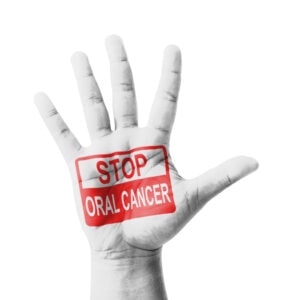
Oral Cancer Signs & Symptoms
The hard part about diagnosing oral cancer often comes from the fact that some of the early signs of oral cancer can easily be confused with other oral health conditions. However, it’s always better to be safe than sorry, so if any of the signs and symptoms below don’t go away within 2-3 weeks, we recommend scheduling an appointment with your dentist in Canton as soon as you can.
Check Your Mouth
While regular checkups with your dentist are certainly important, there are things you can do at home to proactively check for early signs of oral cancer or other symptoms of tooth trouble. Keep an eye out for any new tooth sensitivity, bleeding, or sores in the mouth. Additionally, check in with the Check Your Mouth initiative to help you identify potential abnormalities in the mouth.
Oral Cancer Risk Factors
Even though oral cancer can happen to anyone at any time, there are some things you can do to lower your risk of developing this serious and sometimes deadly disease. Keep in mind that some factors are genetic, but others can be controlled.
Oral cancer is a tricky thing, and the best way to protect yourself against it is to see your dentist in Canton twice a year. Like many oral health problems, oral cancer is best and most successfully treated when it’s caught early.
Welcoming new patients at our dental offices in Ann Arbor, Canton, Farmington Hills, and Livonia.

Stress & Oral Health
Many times, the effects of stress are simplified to include only things like increased anxiety levels, eating habits, headaches, and stomachaches. But it’s also common for signs of stress to first show up as symptoms that affect your oral health. In fact, stress can affect oral health in numerous ways.
While jaw pain could indicate a variety of problems, stress is often at the top of the list. When we’re stressed, especially over a long period of time, our bodies tend to react in a variety of ways. One of those ways is to start clenching or grinding our teeth together. Oftentimes this is done without us even knowing it’s happening, such as during sleep. This results in constant pressure on the jaw joint, making the muscles sore which could eventually cause TMJ disorder or TMD. TMD is painful, and some common signs are the popping or clicking of a jaw, a locked joint, or generalized jaw pain. If you have jaw pain that you can’t explain, talk to your dentist in Ann Arbor.
Many people think that it’s normal for gums to bleed after brushing or flossing. However, bleeding gums at any time should be cause for concern. Bleeding gums is a tell-tale sign of gum disease, but there’s a common misconception related to gum disease. Many people think that gum disease is automatically a result of poor dental hygiene. But the truth is, several other things can increase the risk of gum disease, including smoking, certain medications, clenching or grinding your teeth, and yes, stress. When we experience too much stress, our immune system often becomes worn down. This can allow bad bacteria in the mouth to flourish, causing an infection and leading to gum disease. Gum disease can cause tooth loss, and heart disease, and increase the risk of stroke.
Sores in the mouth, such as canker sores, can be triggered by a vitamin B deficiency or a variety of injuries or irritations. Research also supports the theory that mouth sores can appear during periods of increased stress. Mouth sores that should warrant a visit to your dentist in Ann Arbor include those that appear as white or red ulcers that last longer than two weeks.
Reducing Stress Can Benefit Oral Health
We can’t completely avoid stress in our lives but can do things to manage stress in order to live happier lives and protect ourselves against the negative side effects of too much of it. Some ways to lower stress and therefore the effects of stress, include:
Stress is a natural part of life, and certain amounts of it can actually be beneficial. But too much can cause problems in oral and overall health. During this Stress Awareness Month, focus on your stress levels and how they may contribute to your overall health.
Welcoming new patients at all of our dental offices in Ann Arbor, Canton, Farmington Hills, and Livonia.

How Foods Affect Oral Health
Everything we eat can impact oral health. There are some foods that are great for teeth, and some that can cause problems.
What to Avoid
Best Types of Food for Teeth
Finding the Best Food for You
Nutrition can be complicated. The United States Department of Agriculture (USDA) tried to help us out by introducing the Food Guide Pyramid in 1992 to show us how much of each food group we should strive to eat every day. But the truth is, nutritional needs are individual, and not all of us need the same things in the same quantities. Things like age, gender, height, weight, activity level, and underlying health concerns can make your ideal combination of foods different from someone else. The best way to find out your nutritional needs is to go to MyPlate and customize the best mix of dietary recommendations for you.
Do your part this month, and all year around, to commit to eating better to keep your mouth and body healthy. And, of course, make sure to see your dentist in Livonia at least twice a year for dental cleanings and exams.
We have dental offices in Ann Arbor, Canton, Farmington Hills, and Livonia to best serve our neighbors.

Why is This Day Needed?
Around 90% of the world’s population will develop some sort of dental disease at least once in their lifetime. Additionally, many of the oral health diseases that will affect most of the world’s population are preventable. This is one reason why a day dedicated to talking about oral health is important. By joining together and spreading knowledge and education on the importance of dental health, we can not only do more to protect oral health but overall health, too.
Healthy Mouth. Healthy Body.
Focusing on dental health is just as important as focusing on overall health. In fact, studies show that several diseases can be linked back to oral health problems. For example, research on patients with gum disease shows a probable link between it and heart disease, respiratory disease, some cancers, and diabetic issues.
Signs That There is an Oral Health Problem
Knowing the early warning signs of an oral health problem can make all the difference between a quick, easy fix and risking your overall health. Some of the top warning signs that there is an oral health problem include:
If you recognize any of these signs, we encourage you to see your dentist in Farmington Hills as soon as possible.
Best Ways to Take Care of Your Teeth
Taking care of your teeth and overall oral health is the best way to prevent problems such as gum disease, cavities, and oral cancer. Make sure you:
There’s never been a better time to commit to caring for your smile, and your body, than World Oral Health Day. Head over to WorldOralHealthDay.org to find resources about how you can take action for yourself and your community.
We have dental offices in Ann Arbor, Canton, Farmington Hills, and Livonia. Schedule an appointment at the office nearest you!

Green Mouth
The dye used to turn beer green can also temporarily turn your mouth and teeth green. This may be fun during St. Paddy’s Day but could be odd at any other time. This is why it’s a good thing that any green staining can usually be removed by brushing your teeth. Whitening toothpaste is often the best choice as they contain abrasive properties that can more effectively scrub away stains. Keep in mind that starting celebrations with clean teeth can help reduce stain severity. Areas of plaque or tartar buildup will attract and retain dying agents faster and more severely than clean teeth, much like disclosing plaque rinses show kids areas of their teeth they didn’t clean so well.
However, it’s not only green beer that can cause tooth discoloration. In fact, drinking any type of alcohol excessively can cause tooth staining and make teeth look yellow or brown. These stains tend to be more difficult to remove and may need to be treated with a professional tooth whitening treatment or other forms of cosmetic dentistry from your Canton dentist such as veneers.
Weakened Teeth
The strongest material in your body is your tooth enamel, but that doesn’t mean it can’t be damaged. Acid is usually the culprit behind damaged tooth enamel, and a lot of things we eat and drink are acidic, including beer and other alcoholic beverages. The acidity of these foods and drinks can easily erode enamel and leave teeth at risk for decay, sensitivity, and discoloration. Weakened tooth enamel may be noticed if teeth look gray, dull, or translucent.
Enjoy Your Beer, Protect Your Teeth
Enjoying alcoholic beverages in moderation greatly reduces your risk of any alcohol-related oral health problems. But besides limiting your alcohol intake, there are other ways you can further protect your smile including:
Whether you’re due for a dental checkup or are looking for the best way to whiten your teeth, we’re always happy to see new patients. We have offices in Ann Arbor, Canton, Farmington Hills, and Livonia. Call us to schedule an appointment today.

Dental Implant Surgery
A dental implant is one of, if not the best, ways to replace a missing tooth. Implants can even replace multiple teeth in order to avoid wearing dentures or a bridge. Dental implants are a permanent tooth replacement option so there is no need for removal, soaking, or worrying about slippage. But the treatment itself can cause concern, so let’s take a closer look at the surgery itself.
Before an implant can be placed the area needs to be fully prepped. This can mean different things for different people. If you’re already missing a tooth, there is no need for an extraction. But if a tooth isn’t healthy, it may need to be extracted by your dentist in Livonia first. Additionally, patients may sometimes need a bone graft to prepare the jaw bone and make it stronger for the actual implant placement.
There are actually a few pieces and parts to a dental implant. The first part is the implant post which is metal and screw-like. This post is placed into a drilled hole in the jawbone and acts as an artificial tooth root. Once the post is placed, it will need time to integrate into the jawbone. This healing period can take a few months but it’s absolutely necessary in order to ensure a stable implant.
Once the post is fully integrated and fused into the jaw bone, your dentist will attach an abutment and then a crown on top of it. Crowns are custom made in size, shape, and color to look like a natural tooth so the restoration blends into the smile. The final result is a permanent, complete, natural-looking smile.
Dental Implant Pain
Now that we know a little more about what’s involved with getting a dental implant, let’s take a deeper look into how much pain is involved. Since dental implant treatment is in fact a surgery, patients should expect some level of pain, but it’s probably not as bad as you think. Patients shouldn’t experience any pain during the actual post placement, but they may have some discomfort for the next 10 days after surgery. If pain lasts more than 10 days, call your dentist. Excessive pain after 10 days may be a sign of an infection so it’s important to see your dentist sooner rather than later.
Dental implants are often considered the superior tooth replacement option. So if you are missing teeth or at risk for losing teeth, talk to your dentist in Livonia about whether or not dental implants may be the best choice for you.
We’re always accepting new patients at all of our dental offices in Ann Arbor, Canton, Farmington Hills, and Livonia.

While you head online and search for “dentist near me,” one of the easiest ways to quickly narrow your search is to talk to those around you. Ask friends, family, neighbors, or coworkers about their dentists to easily generate a short list of choices.
After you get a few recommendations, head online to read reviews of dentists in Farmington Hills . Online reviews are a great way to get an understanding of the general feelings about the level of dental care, personality of the team, and pros and cons.
Patients who are particularly interested in advanced dental care such as cosmetic dentistry or dental implants should check out dentists’ previous work. Many dentists will feature before and after photos on their websites so you can get an idea of their level of care.
Some dental offices offer most services under one roof while others have a particular focus in specific areas. Depending on your individual needs, you will want to look into the types of services offered at different offices. Also consider their technology and how it can help make dental care easier.
The best way to get a feel for a dentist and their team is to visit them in person. An initial visit or consultation will give you a sense of the office environment and personality. While patients may prioritize different things, it’s always important that you feel the office is clean and that you’re being listened to and respected.
While it may seem like a daunting task, taking some time to get to know your options when it comes to choosing the best dentist in Farmington Hills can benefit you in the long run. Start by making a list of the things that matter to you the most when it comes to selecting a dentist, then get to work researching dentists in your area. Keep in mind, the more comfortable you are with your dentist, the more likely you are to keep up with regular appointments. Seeing your dentist at least twice a year is crucial to maintaining good oral health and can keep dental problems away.
Accepting new patients at our dental offices in Ann Arbor, Canton, Farmington Hills, and Livonia.

“Brush, Floss, Smile!”
This year’s slogan is Brush, Floss, Smile! helps both kids and caregivers learn just how important it is for kids to brush their teeth regularly as well as floss in between each and every tooth. To help, ADA has put together fun, interactive games and activities to make learning about dental care fun for kids. Head on over the ADA website and download all sorts of free educational tools including coloring sheets, crossword puzzles, and a calendar to keep track of brushing habits.
How Should Kids Brush & Floss?
Brushing and flossing tiny teeth are important, but your dentist in Ann Arbor will also encourage you to make sure your little ones are doing them correctly. Developing proper technique and a solid routine will help children throughout their lives..
Proper Brushing
Kids and adults should brush their teeth twice a day, once when you wake up in the morning and once before bed at night. Use the following techniques:
A thorough brushing should take about two minutes. Don’t shy away from humming songs or finding two-minute brushing videos to turn a habit into a fun activity.
Proper Flossing
It’s just as important for kids to floss once a day as it is for adults, and little ones should start flossing whenever they have two teeth that touch each other. But like brushing, flossing requires a specific technique, and it can be hard for kids. The best way to floss is gently wiggle the floss in between each tooth and curve it up under the gums. You can try traditional floss but you may have more success with a floss pick.
While brushing and flossing are crucial for all smiles, maintaining visits to your dentist in Ann Arbor is also necessary. Schedule an appointment today!
We have dental offices in Ann Arbor, Canton, Farmington Hills, and Livonia.

Sinusitis, also known as a sinus infection, can have similar symptoms to a toothache, and you may be wondering which may be affecting you. The good news is that your dentist in Canton knows the difference between the tell-tale signs of a toothache versus those of a sinus infection. Let’s take a look at the similarities and differences.
Sinus infections can cause tooth pain, although a tooth may not be the underlying problem. Knowing the difference between a sinus infection and a toothache can help you get the proper help you need to relieve discomfort. First, the common signs that are apparent in both a sinus infection and a toothache include:
It may be difficult to understand where these symptoms are originating from, so now let’s look at the difference between a toothache that’s caused by a sinus problem and one caused by a dental problem.
Any type of pain is uncomfortable, but your dentist in Canton knows that tooth pain has a unique feeling and can cause alarm. It’s incredibly common for patients to not know the difference between actual tooth pain and tooth pain that’s caused by a sinus infection.
While toothaches can have some of the symptoms of a sinus infection, there are some key differences:
Why can a sinus infection cause tooth pain in the first place? Well, it all comes back to anatomy. The sinus cavity is located around the forehead behind the eyes as well as on the sides of the nose, and tooth roots of some teeth are really close to the area. This is why when the sinus cavity becomes inflamed as a result of infection it can be felt in the teeth.
It’s unlikely that a sinus infection will cause pain in other teeth other than the top back molars. Since the roots of the top back teeth are close to the sinus cavity, pain during a sinus infection is most likely to occur in this area. A toothache in the front teeth or lower teeth may be a clear sign of a dental problem and should be checked by your dentist in Canton. If you’re experiencing jaw pain, it’s also wise to see your dentist. This discomfort can be attributed to many things, including a sinus infection, tooth troubles, or a misaligned bite.
Long story short, any type of tooth pain should be looked at by your dentist. If they determine the cause isn’t related to something happening in your mouth, they may refer you to another type of doctor to get a proper diagnosis and treatment.
We have dental offices in Ann Arbor, Canton, Farmington Hills, and Livonia. Call the dentist closest to you to schedule an appointment today!

Every Six Months Is Key
Everyone can benefit from seeing their dentist in Canton at least every six months. These regular checkups and cleanings help prevent problems and can even catch small issues before they become big. They can also help denture-wearers in the following ways.
Oral Health
Despite the fact that dentures have replaced all of the natural teeth, there are other areas of oral health that need to be protected. Dental care goes beyond caring for the teeth as the gums, tongue, and jaw bones also need regular care. Denture-wearers, in particular, should see their dentist at least twice a year to monitor overall oral health. In fact, dentures may increase the likelihood of developing gum disease, as well as affect jaw bone density. Plus, the size and shape of the mouth change over time, which means the fit of a denture also changes. Dentures often need regular adjustments to remain comfortable.
Overall Health
Believe it or not, regular dental care can not only protect your oral health but also your overall health. Gum disease, for example, is more common in denture-wearers and should be caught as early as possible. Advanced gum disease can’t be cured and can even lead to whole-body problems such as heart disease and diabetes. Additionally, your dentist in Canton is always on the lookout for oral cancer and looks for signs of this serious disease at every appointment. Oral cancer can be treated successfully with early intervention, which makes regular dental appointments even more important.
Denture Health
Dentures are not a permanent solution to missing teeth. But they can last over 7 years with proper at-home care and regular dental appointments. Dentures can sustain regular wear and tear, and sometimes the patient doesn’t know that micro-damage has occurred. Having your denture checked at regular dental appointments can catch and fix any minor problems.
Essentially, everyone should see their dentist every six months, no matter how many teeth they have. These preventive appointments help protect your health and can prolong the life of your denture.
We’re always welcoming new patients at our dental offices in Ann Arbor, Canton, Farmington Hills, and Livonia.